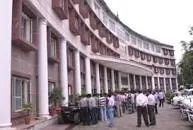Govt delivers on PRIs in J&K

Thursday, 22 October 2020 | PNS | New Delhi/Jammu
Cabinet OK’s J&K Panchayati Raj Act for 3-tier grassroots democracy
Paving the way for the “establishment of all the three tiers of grassroots-level democracy in Jammu & Kashmir like in other parts of the country for the first time since Independence”, the Union Cabinet on Wednesday approved the adoption of the Jammu & Kashmir Panchayati Raj Act, 1989.
“The three-tier system was not there in Kashmir before. They did not have the opportunity to elect their local representatives. This step redeems the promise made by Prime Minister Narendra Modi in Kashmir, and the Home Minister in Parliament. This will help the people of J&K to elect their representatives at the village, block and district levels,” Information and Broadcasting Minister Prakash Javadekar said.
“Now, there will be early elections, and the power to manage local bodies will go to the people,” he said, adding that the J&K administration is working on the adaptation of other laws following the abrogation of Article 370 and division of the State into two Union Territories by giving Ladakh a separate UT status.
There is a lot of homework to be done, but the principle has been established, Javadekar asserted even as several Union Ministers took to Twitter to hail the Cabinet decision.
Terming the Union Cabinet’s approval a watershed moment in the history of J&K, Lieutenant Governor Manoj Sinha said the Government of India has fully applied the 73rd Constitutional Amendment 1992 to the UT of J&K which was pending for the last 28 years. With this, all three tiers of Panchayati Raj Institutions (PRIs) shall be formed for the first time in the history of Jammu & Kashmir, he said.
The Jammu & Kashmir administration had on Saturday amended the Jammu & Kashmir Panchayati Raj Act to provide for setting up District Development Councils (DDCs). Under the new arrangement, the DDCs are set to become a new unit of governance in the UT, thereby completing the implementation of the three tier system.
The landmark decision is expected to ensure liberal funding of Central Government schemes aimed at improving the living conditions of the masses and also strengthen the rural infrastructure in the remote and hilly areas.
Ahead of the abrogation of Article 370, the existing District Development Boards were abolished to pave way for the establishment of two tiers of Panchayati Raj Institutions. The decision was necessitated because the existing guidelines of the DDBs had no provision for any transfer of funds or responsibility to Block Development Councils (BDC) or to the Halqa Panchayats as these tiers of local Government had not been in existence in the State earlier.
The concept of single line administration was introduced in Jammu & Kashmir in 1976 with a view to push development projects and decentralising planning and involving the people with the same.
In the coming days, the Jammu & Kashmir Government is expected to announce the poll schedule to elect members of the DDCs. As per the amendment, the DDCs of each district shall have 14 constituencies after their delimitation by the respective deputy commissioners.
Political parties like the Congress have termed it to be “another attempt to further delay the Assembly elections and also deprive the existing BDCs from the rights already vested in them because a majority of them have non-BJP affiliations”.
Another challenge that remains for the Centre is that of holding the bypolls to over 13,000 vacant panch and sarpanch seats in Jammu & Kashmir. The Administrative Council, headed by Lieutenant Governor Manoj Sinha, has already approved the proposal to conduct the by-elections and the notification is likely to be out soon.
In 2018, elections to 39,521 sarpanch/panch constituencies in 4,483 Halqa Panchayats were conducted. Of these, 13,257 positions are currently vacant due to resignations, removals, election of sarpanchs as Block Development Council chairpersons, deaths as well as non-availability of candidates at the time of election. Among them, 1,089 vacancies pertain to the office of sarpanch, whereas 12,168 are panch vacancies.
Elections to the vacancies notified previously were postponed due to “security concerns” and the onset of Covid-19.





